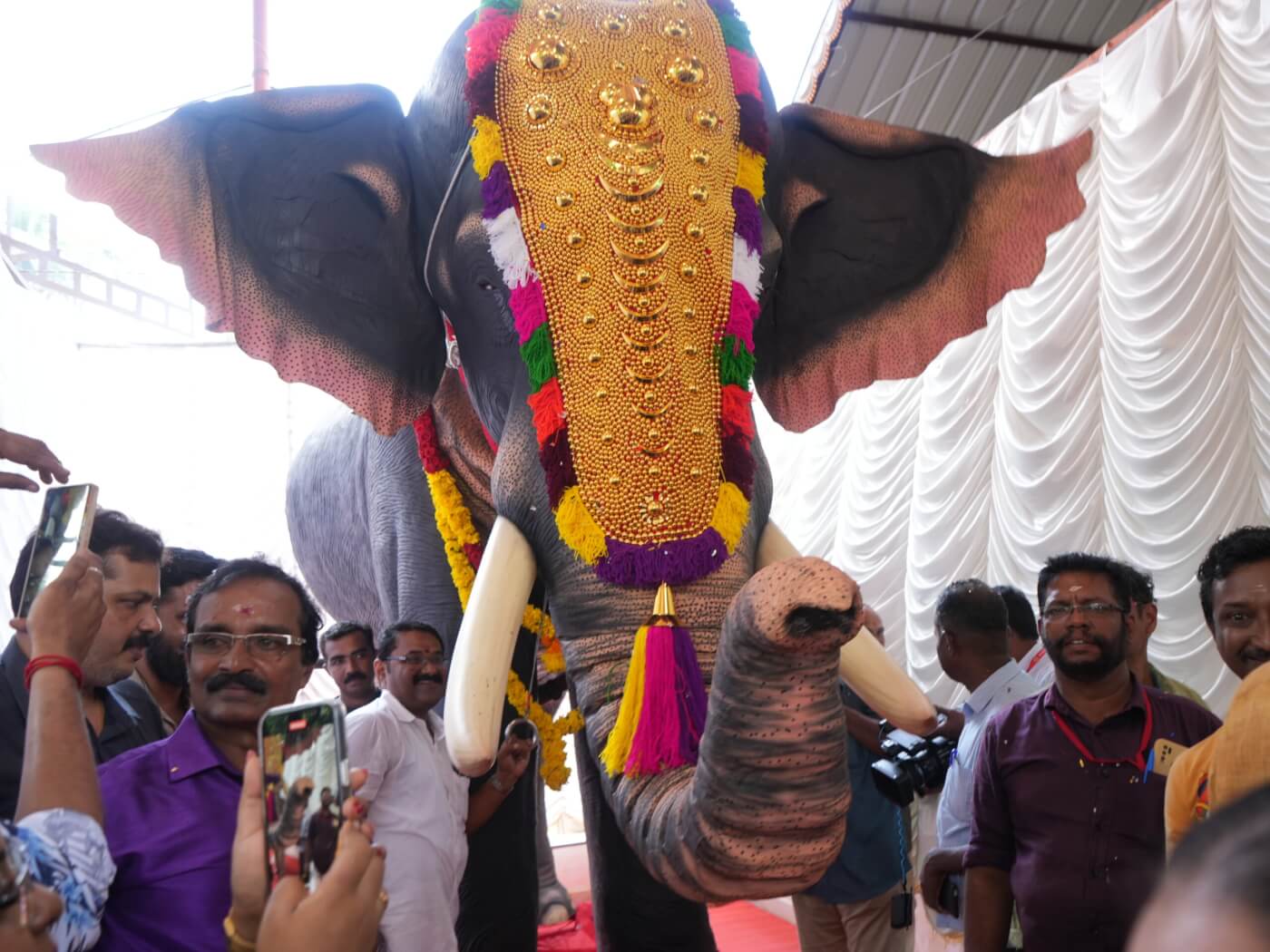Adah Sharma and PETA India Gift Life-Size Mechanical Elephant, Baladhasan, to Thiruvananthapuram’s Pournamikavu Temple
Renowned actor Adah Sharma and PETA India have donated a life-size mechanical elephant, Baladhasan, to the Pournamikavu Temple in Thiruvananthapuram in recognition of the temple’s decision never to own or hire live elephants. Baladhasan will be used to conduct ceremonies at the temple in a safe and cruelty-free manner, helping real elephants stay with their families in the jungle. An inauguration ceremony was held today at the temple followed by a chenda melam and a panchavadyam performance.
“Technological progress allows us to preserve our deep cultural traditions and heritage while allowing elephants, who are endangered, to live with their families in the jungle. I am delighted to contribute this mechanical elephant with PETA India, enabling followers to participate in sacred rituals in a manner that is both safe for humans and respectful of animals”, says Adah Sharma.
“On this auspicious Pournami day, we are delighted to have mechanical elephant Baladhasan with us in honour of all the divine creatures who yearn to roam the earth free and secure with their loved ones,” says Pournamikavu Temple Mukya Karyadarshi MS Bhuvanachandran.
“We are delighted to welcome mechanical elephant Baladhasan to our temple as a representative of all of God’s created animals, who deserve our compassion and respect,” says temple president Ananthapuri Manikandan.
View this post on Instagram
Many elephants in captivity in India, including in Kerala, are being held illegally or have been transported to a different state without permission. Because elephants are wild animals who do not willingly obey human commands, when used for rides, ceremonies, tricks, and other purposes, they’re trained and controlled through severe punishments, beatings, and the use of weapons with a metal-tipped hook. Many have extremely painful foot ailments and leg wounds from being chained on concrete for hours on end, and most do not get adequate food, water, or veterinary care – let alone any semblance of a natural life.
The frustration of captivity leads many elephants to develop and display abnormal behaviour. At their wit’s end, frustrated elephants often snap and try to break free, running amok and harming humans, other animals, and property. According to figures compiled by the Heritage Animal Task Force, captive elephants killed 526 people in Kerala in a 15-year period. Thechikottukavu Ramachandran, who has been in captivity for about 40 years and is one of the most often used elephants in Kerala’s festival circuit, has reportedly killed 13 individuals – six mahouts, four women, and three elephants.
Three life-size mechanical elephants are already in use through PETA India’s efforts in recognition of temples’ decisions never to own or hire live elephants. They include Irinjadappilly Raman at the Irinjadappilly Sree Krishna Temple in Thrissur, Mahadevan at the Thrikkayil Mahadeva Temple in Kochi, and Shiva at the Jagadguru Sri Veerasimhasana Mahasamsthana Math in Mysuru. A fourth robotic elephant, Shankara Hariharan, was donated to the Sree Sankaran temple in Gudalur by the founding executive director of Voices for Asian Elephants. PETA India encourages all venues and events exploiting real elephants to switch to lifelike mechanical elephants or other means in place of live animals. PETA India advocates for elephants already in captivity to be retired to sanctuaries where they could live unchained and in the company of others of their kind, healing psychologically and physically from the trauma of years of isolation, captivity, and abuse.
The Pournamikavu Temple is located in Venganoor, Thiruvananthapuram. Its main deity is Shri Bala Tripura Sundari Devi, and the temple’s consecration of idols of the 51 Akshara devathas is a world first. The temple is also known for a number of idols that are the largest of their kind in the world, including a Panchamukhi Ganesha idol carved from a single Krishna Shila stone, which stands 2 metres tall; a Nagaraja idol carved from a single stone, which is 2.75 metres tall; and a Panchaloha idol, which is nearly 2 metres tall and weighs 1300 kilograms.









